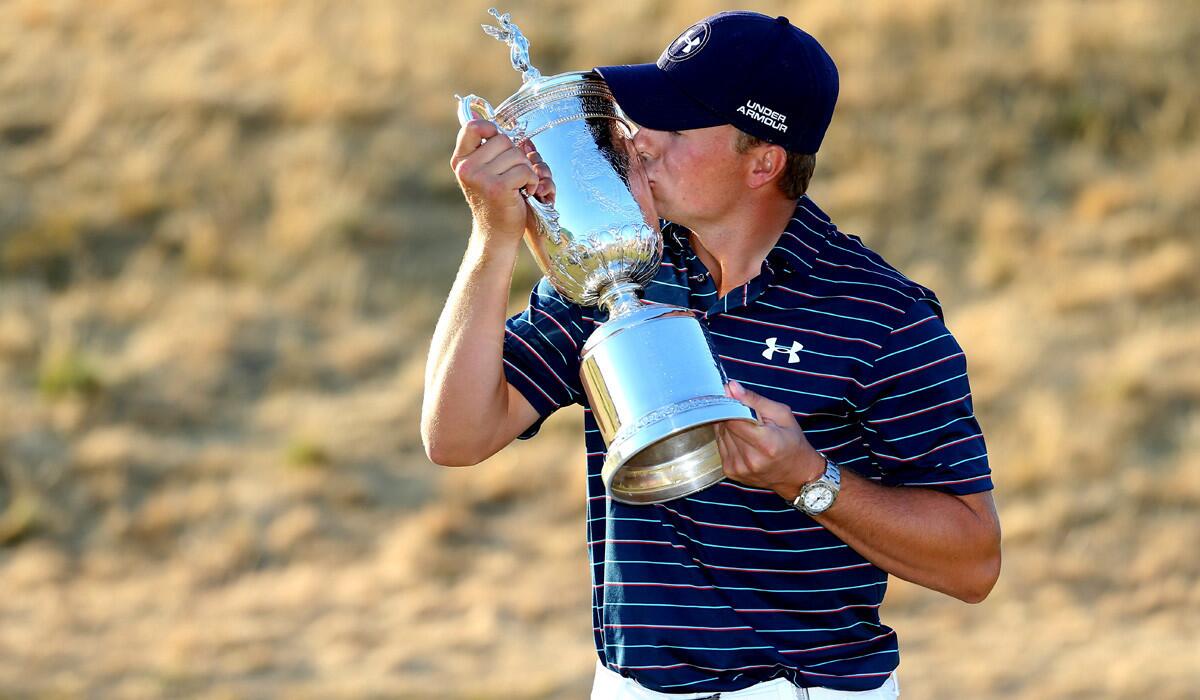Jordan Spieth is halfway to history after U.S. Open triumph

Jordan Spieth kisses the trophy after winning the 115th U.S. Open Championship at Chambers Bay on Sunday. He becomes the sixth golfer to win the U.S. Open and The Masters the same year.
- Share via
Reporting from UNIVERSITY PLACE, Wash. — Jordan Spieth brought it up. No one had to ask.
Before the 115th U.S. Open, in talking about how he might judge his season if it had been cut off a week ago, with a first Masters green jacket already in his closet, the 21-year-old said with more wonderment than arrogance that he wouldn’t nearly be satisfied.
He had a very keen focus on the next big prize.
“You can’t win the Grand Slam unless you win the first,” Spieth said, “and I’m the only one who has that chance.”
Spieth doesn’t shy away from bold statements or daunting challenges, and he didn’t wilt Sunday in a nervy final stretch of the gnarly test that was Chambers Bay.
Minutes after suffering what could have been a devastating double bogey at the par-three 17th, Spieth birdied the 18th hole on Sunday to shoot one-under-par 69, finish at five under and become the youngest U.S. Open winner since Bobby Jones in 1923.
In another parallel with Jones, Spieth is the first since the legend to birdie the 18th hole to win a U.S. Open by a shot. He is the youngest winner of two majors since Gene Sarazen in 1922.
One man’s triumph was another’s crushing blow. Dustin Johnson, who already had felt the sting of squandering two major championships in the final round, all but handed Spieth the trophy with a stunning final failure of a putter that went stone cold on the back nine.
After hitting a tremendous second shot on 18 to give himself a 12-foot eagle putt to win, Johnson hit his putt too hard and it trickled four feet long. On the comebacker to force an 18-hole Monday playoff, Johnson’s ball never touched the hole, sliding by on the left.
All week the poor condition of the greens had been a target of numerous players.
“Whatever the putt did on the last hole, I don’t know,” Johnson said. “I might have pulled it a little bit. But still to me it looked like it bounced left. It’s tough. It’s very difficult.”
So devastated by the loss was Johnson, who shot 70, that he declined to attend the awards ceremony to receive a second-place medal along with South African Louis Oosthuizen, who made an extraordinary charge with a six-birdie back nine of 29 to score 67.
“I very much feel for him. He’s certainly proven he can close tournaments out,” Spieth said of Johnson. “That was an odd deal.”
Putting aside his empathy to reflect on his own joy, Spieth said, “You only get a few moments in your life like this. I recognize that. It’s hard to wrap my head around — two in one year.”
In winning the first two majors of the season — he captured the Masters in April by four shots — Spieth is now in this company: Ben Hogan, Jack Nicklaus, Arnold Palmer, Tiger Woods and Craig Wood. It’s an almost unimaginable feat for a young man who turned professional only three years ago and had only one career victory before this season.
A self-described golf historian, Spieth said, “It gives me goose bumps. To think of . . . how fast we’ve risen to get on tour, and to contend and win major championships . . . it just gets better.”
A twisting birdie putt at No. 16 briefly gave Spieth a three-shot lead and prompted a celebration “that was about as animated as I’ve been since maybe throwing a tantrum when I was 13 on the course,” he said with a grin.
Spieth’s lead was two by the time he arrived at the 17th tee. But he flailed his six-iron shot “to the easiest pin of the week” well right, and after getting his next shot on the green he three-putted, missing the five-foot bogey effort to make double.
More to Read
Go beyond the scoreboard
Get the latest on L.A.'s teams in the daily Sports Report newsletter.
You may occasionally receive promotional content from the Los Angeles Times.










